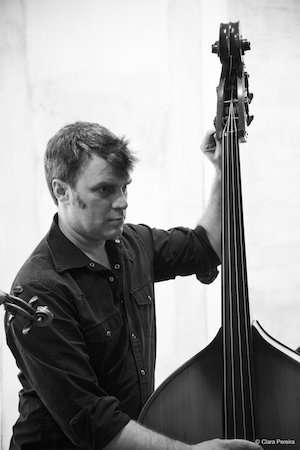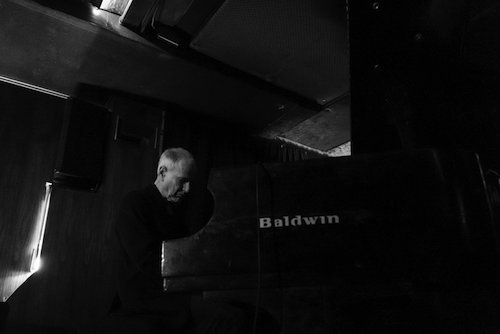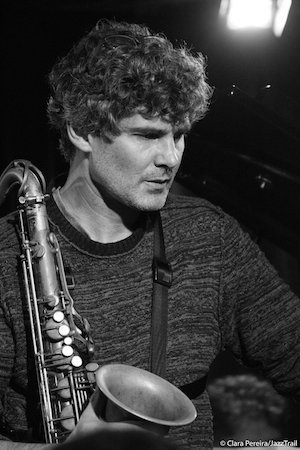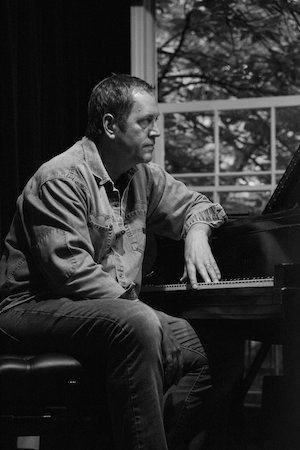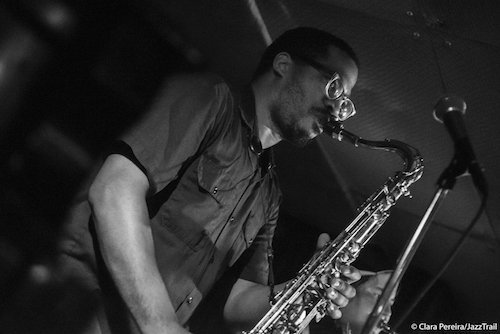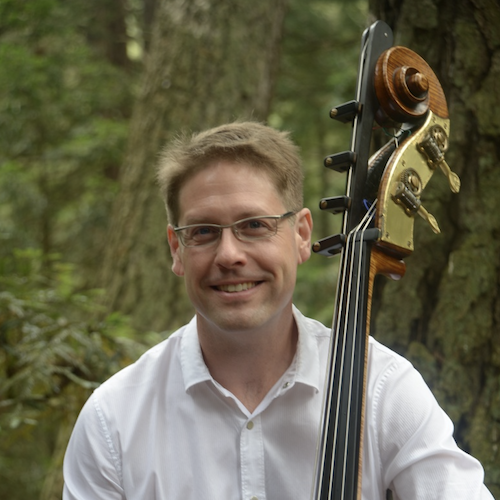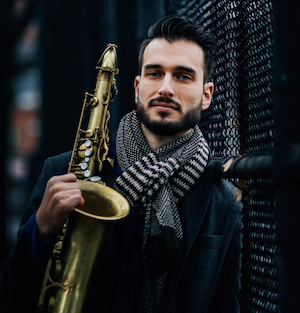Name: Edward Gavitt
Instrument: guitar
Style: contemporary jazz, fusion
Album Highlights: Secret Mall - System32
How did the Covid-19 pandemic affected you as a musician and what are you doing to fight the current adversities?
Mostly it's the same as everyone, lost literally all my gigs for the unforeseeable future. Particularly, I was looking forward to a recording session with Secret Mall and a tour with friend and colleague Colin Hinton and his band Simulacra. I'm one of the lucky ones to have a job aside from just performing, although a good percentage of my income is totally gone.
Teaching is one thing keeping me busy. I'm doing some engineering work and the free time is allowing me to experiment a bit more with projects I'm working with, just seeing what happens when I do this or that, and I also get to practice and write more. I think my main personal focus right now is that I'm working on an educational Youtube channel. A few months before the quarantine I had actually bought some nice lighting equipment, and I already had a nice camera from some time ago. I find that many of the successful Youtube channels are run by people who are not the greatest musicians. There are some exceptions, for example, I really like Adam Neely's channel as well as David Bruce Composer and Nahre Sol. But for the most part, a lot of it is bad information and clickbait. Mostly all the NYC musicians I know could make some amazing content, but from conversations, many have a hard time adapting to that format. I know some NYC musicians that have taken the platform seriously, such as Brian Krock, or Glenn Zaleski and Dan Weiss who have been doing for it a bit longer. But I think it can be a great source of income and what better time is there to build an online following in a time when literally everyone is stuck online?
You’re also the house manager of The Jazz Gallery, a distinguished New York jazz venue. What has been the reaction of the venue to the cancellation of the shows?
Yeah, this has been a very interesting time for The Jazz Gallery. Our last concerts were the Tyshawn Sorey residency shows which ended on March 7th. I can't think of a better last concert before closing up that we could have had. I think we called a staff meeting the next day because we needed to figure out what to do. Unfortunate things happened such as our house staff losing their work and musicians losing their gigs. But in a few short days we figured out some things we could do to keep the community going and get some musicians paid.
The first things we came up with were the Happy Hour Hangs and the archive releases. The Happy Hour Hangs are small virtual gatherings we do a few times a week via Zoom. We cap the attendance at 15 people so everyone can participate and the crowd is manageable. Some people don't know how to use Zoom yet so you have people not muting themselves, audio trouble, camera trouble. The small capacity helps keep everything under control and gets everyone participating. The hangs feature a different musician each time but we also try to bring in special guests and let musicians bring in their friends as well.
I'm handling the archive project. I'm just going through our archives and curating the release of videos or recordings we've done at the Gallery. We've released three so far: the Tribute to Roy Hargrove Big Band from Dec 2019, John Ellis' The Ice Siren from their album release concert this past February, and Shai Maestro's piece "Time" which was a Jazz Gallery commission from 2018 (feat. Phillip Dizack and Joel Ross). I'm also mixing these recordings to get them to sound better (or enhancing the bootleg style recordings from our handheld recorder). We release these on Wednesdays, although we have a special one coming up on Sunday 5/3. We are hosting a tribute to our dear friend Lee Konitz who unfortunately passed away recently. Lee played his last performance at The Jazz Gallery for a concert put together by Ohad Talmor, who is an incredible composer and saxophonist and a good friend. We celebrated Lee's 92nd birthday this past October with a special quartet/nonet performance, so we are going to stream some of that footage as well as gather some of people close to him to pay him tribute.
We also started a weekly dance party on Tuesdays with a special guest DJ every week. We've had so far Ben Williams, Miguel Zenon, and Rio be DJs, and we have some more very special guests coming up soon. We've also kept up with our blog and have continued interviewing musicians that were supposed to play at the space before the quarantine.
Lastly we have the Lockdown Sessions, which is a great series Rio came up with that came from recognizing how bad live streaming can be. The audio quality usually isn't good or the video can get lost. Our Happy Hour Hangs aren't exactly focused on the music but just about talking and keeping each other company, and the reason for this is we don't want to showcase a musician in a setting they are not comfortable with (solo, poor quality, etc). During the Lockdown Sessions we ask musicians to pre-record a 15 minute set which they can produce as much or as little as possible, and they present it via Zoom's screen share feature. It fills the gap between live streaming and a gig, where musicians can control what they present while it being on an online platform. It basically becomes a semi-live performance but also has been dubbed a "jazz variety show" or "jazz MTV" by some of the musicians, it's actually really fun seeing the amazing things musicians come up with. Each week we have four acts. And for some shameless self-promotion, Rio asked my group Secret Mall to perform on May 9th, so we're going to do something fun for that.
The full schedule of all our activities is on our website, www.jazzgallery.org for anyone that wants to take a look at what's going on.
What do you envision for the future of The Jazz Gallery?
We really believe that gatherings will not immediately return to normal. Right now, we're under the impression that quarantine will be lifted on May 15th (probably not, but let's say it does). There is no way any venue is going to be packed that same night. People are still going to feel unsafe about going out, and if they do go out, are they really going to want to be packed like sardines in some venue? We think the most practical thing is to gradually open until things are safe. One of my ideas has been to do live streamed concerts from our space with no audience. I'd go and set the musicians up, put up a camera, mic everything up, and it would just be us, so I hope we can make that happen. Eventually we will open up again although we don't have a set date but its looking to be at the earliest late summer, most likely at a capped attendance, and gradually increase that. But through our online endeavors we've kept people happy. We have actually gotten new members, some donations, and gotten some sort of income for musicians. Things aren't great, but it's not exactly terrible yet.
The latest album from your group Secret Mall is called System32 and it was self-released in 2019. Who had the idea to form the band?
So Alfredo Colon and I went to school together at the City College of New York. It's a small program, and Alfredo is one of two people I regularly play with that I went to school with. When he started the undergraduate program I was just finishing mine, but we really started hanging out when I started grad school and he was maybe a sophomore or junior. He was just a funny guy to hang out with. He started working at the Gallery around that time. I didn't know Steve Williams at that time, but he had emailed me to do an internship at the Gallery via The New School. Alfredo knew Andres Valbuena a bit from some program they did in High School. Andres had asked Alfredo about working at the Gallery and it worked out. So basically the four of us were working at The Jazz Gallery, it was really fun to just hang out with those guys. A gig came up for Alfredo and I where we were going to play at Madison Square Park one afternoon for some event, and we needed to call some people. Alfredo and I wanted to start a band and he drunkenly Snapchatted Steve asking if he wanted to - not play, but join the band, which is a big committment as we had never even heard him play before. We just called him because he was fun to hang with. We lucked out because as it turns out, Steve is a good bass player! Andres we already knew was amazing, so we rounded it up with him, and played this gig at Madison Square Park which went pretty well.
We were all also very much into internet humor and internet culture. For example, Vaporwave was a strange music genre that had its thing in like 2014-2016. We were really into the visual element of that, though, so we use that aesthetic in a lot of our visuals and incorporate some of the sounds into our music. We also love internet memes. Our first EP is entirely based on a meme called Yee (which can be found on Youtube). Our full length System32 sort of follows the same idea, but we also enlisted some friends to bring in some funny moments such as Chris Morrissey's voice mail or Joel Ross' synth solo.
The band was a quartet since the beginning, but on System32 we decided to add more sounds to the record with electronics, and decided it would be a good idea to add a keyboard player, we called our good friend Theo Walentiny who is one of the most incredible pianists from our scene, and while we have yet to play with him, we're really looking forward to seeing how much fuller the band sounds with him.
We were actually going to record our next album around this time, we had two days at a studio booked but things happened, so whenever things loosen up, we're getting back on it.
Who influenced you the most as a guitarist?
I can mention a couple of people: Michel Camilo is probably the first one. Growing up in the Dominican Republic, I didn't exactly have access to a lot of music education. I played in rock and metal groups but had never really heard a jazz album until I was 17. Interestingly enough, I heard Michel Camilo on the radio one night. It was a piece of his called “Suite Sandrine”, and I just remember my jaw on the floor, having never heard anything like this but I just thought ‘I want to do this’, and especially finding out that Michel is Dominican played a huge part. He's the reason I went to school for music.
Jim Hall was another big influence. There was something about Jim's playing. Everything he played was just perfect. I remember learning about him and listening to him on The Bridge, or on Live! and just thinking how different this was from everything I'd been hearing before, he didn't sound like any other guitarist at the time. And then learning he was still alive (at the time)! I got to see him a few times before he passed and actually got to talk to him once, I was being such a fanboy at the time. Same thing with Lee Konitz. He was also one of those guys that didn't sound like anyone else, he even talked about it a lot. And I had the same reaction learning he was also still alive. I got to meet Lee a bunch of times through the Gallery. He was truly a funny guy and one of the most unique voices in music. Both Jim and Lee's playing, which avoided cliches and generic jazz vocabulary appealed to my approach so much. Following the Jim Hall lineage, I also love Peter Bernstein. His vocabulary is just so unique and everything he plays is so tasteful. He's also one of the nicest guys.
Miles Okazaki is also a huge influence, I studied with him for quite some time and got a lot from him. I had been wanting to study with Miles for years before moving to New York, but I remember hearing Generations and just trying to figure out what was happening. His approach to rhythm and time and his scholarly nature are things I really admire about him. He has a really great Instagram account where he is methodically going through every pitch set combination and demonstrating them. I recommend strongly recommend checking that out.
Allan Holdsworth is probably my biggest influence right now, though. I've been digging really deep into his music for the last year or two. The things he plays are absolutely unreal, a lot of things sound like he's literally opening up a portal to a new dimension. I got into him late unfortunately, just shortly before he passed so I never got to see him live, but his music has really influenced more than probably anyone else. In that tradition I'm also following Tim Miller, who has a sort of Holdsworthian quality to his playing, but he doesn't sound like Holdsworth. He has his own thing going on which I'm also very much into.
Can you tell me two persons whom you’ve never collaborated with but you’d like to?
So many! I think in a realistic sense, my friend Lex Korten who is an amazing pianist. You can hear him in many settings, most recently on the latest Tyshawn Sorey record Unfiltered. Despite knowing him for a while now we have yet to play together, but we've talked about it. He's gonna be huge so I know I have to get to it soon! I'd also really love to play with Evan Marien. He's an amazing bass player and actually played a bit with Holdsworth. He writes some really great music, shreds, and everything he plays feel so good.
Name your top 3 jazz albums.
I don't think I can say top 3, because I love so many records, but here are 3 that I can think of off the top of my head.
Jim Hall Live! Don't make me choose a volume, I'm just going with the box set! This stuff is just incredible. I remember listening to this record when it was just Vol. 1 out, and then finding out there were 3 more volumes! I was over the moon. Jim sounds great here but his rhythm section (Don Thompson and Terry Clarke) is ridiculous. Terry in particular has some of the most amazing dynamics.
I'm going to put a blanket over Allan Holdsworth, whatever album of his I'm listening to at the moment is my favorite Allan Holdsworth album. But some particular mentions are Sixteen Men of Tain, Secrets, Atavachron, and Then! I'm also super excited for a live DVD/CD that's coming out from a 1986 gig in Frankfurt with Gary Husband, Jimmy Johnson, and Key Akagi.
And for number three... Kate Gentile's Mannequins. Kate is just amazing. She can play just about anything, and writes some really unique music. She's definitely one of my favorites. Ah, so many more I want to talk about!
Name your top 3 non-jazz albums.
Right now, Chon's self-titled album. Chon is this progressive rock band from San Diego. They're all fantastic musicians. I learned about them around 2008 when they were like 14 (the drummer was like 10 around that time) but they were shredding! Their music has matured so much throughout the years, and this more recent record is really great.
There's a lot of classical stuff I check out. One record I really like is this album Shrouded Mirrors by guitarist Diego Castro Magas. He's a Chilean classical guitarist who focuses on performing music by contemporary composers. This album actually led me to discover Bryn Harrison who is now one of my favorite composers.
Lastly, the Animals as Leaders self-titled album is probably going to be one of my all time greatest influences. This album completely redefined modern metal. While this comes straight from the Meshuggah lineage, it was a very different sound that really just had not been heard. It's probably not my favorite Animals as Leaders record from their discography, but definitely the one that really changed the game. I find it awesome that Tosin Abasi (one of the guitar players) is really into jazz too. He's cited people like Kurt Rosenwinkel and Adam Rogers as influences.
What would you have been if you weren’t a musician?
I was set on going to school for psychology before that Michel Camilo story, so probably that. I'm not sure though. I obviously would have had to do something if it wasn't music, but I tend to not think about it too much.
Despite the situation we’re living in, life goes on. Plans for the future?
Yeah, I'm very lucky and privileged that my mental health is well right now. I know many people having a hard time and I really feel for them. I've been working like normal, just from home. Despite being home all day, things seem busier though. There's a lot more Jazz Gallery work, but I also have more time to practice, write, produce.
Probably the most immediate thing is building the Youtube channel I mentioned. I already uploaded a video last month that I sort of used as a "beta test" to get some criticism and see how I can improve that. So right now I'm scripting a bunch of topics for videos to start releasing them in May.




